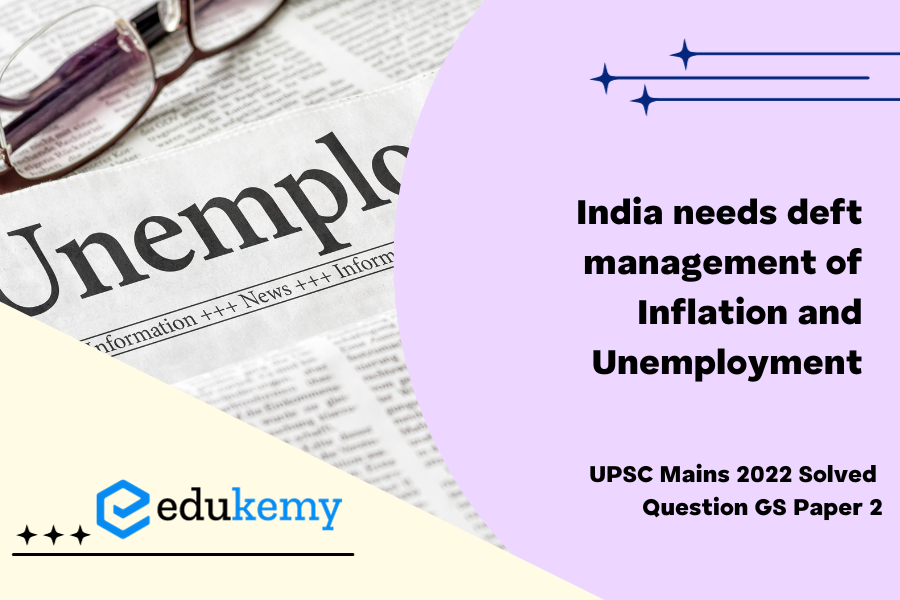While welfare schemes address immediate needs, effective management of inflation and unemployment is crucial for sustained poverty alleviation in India. Controlling inflation ensures the purchasing power of the poor remains stable, while tackling unemployment fosters inclusive growth, providing lasting benefits to the underprivileged sections of society.
UPSC Mains General Studies Paper – 2 Mains 2022
UPSC Mains Civil Services IAS Exam Question Paper – 2022
Contents
Approach
- In starting, give a brief intro of the key word “welfare schemes”.
- Discuss Deft management of inflation and unemployment poor and the underprivileged sections.
- Way forward/suggestion
- Conclusion
Answer
Introduction
- Welfare refers to assistance programs sponsored by governments for needy individuals and families, including schemes, such as food stamps, health care assistance, and unemployment compensation. These welfare schemes are typically financed through taxation. India has rolled out several welfare schemes to uplift the poor and underprivileged sections of the society.
Body
- Welfare schemes are important for the upliftment of the poor and underprivileged sections of society, but they alone cannot ensure a sustained improvement in their living standards. Inflation and unemployment are two major challenges that need to be addressed to create an environment conducive to the growth and development of the economy, which will in turn benefit the poor and underprivileged.
Deft management of inflation and unemployment in poor and underprivileged sections. These are important limitations to consider when discussing the role of welfare schemes in managing inflation and unemployment for the poor and underprivileged sections of society.

- Exclusion errors: The exclusion of eligible individuals from welfare schemes can hurt their access to essential services and subject them to market vulnerabilities. This can result in inflationary pressures for these individuals who are forced to access services from the market.
- Direct Benefit Transfer (DBT): While DBT is a step towards reducing corruption and leakages in welfare schemes, it also has the potential to subject beneficiaries to market vulnerabilities. For example, when LPG subsidies are provided as cash transfers, it becomes subject to inflationary pressures.
- Wage payments: Wage payments under welfare schemes such as MGNREGA are not inflation-adjusted, resulting in poor wages for workers who are unable to cope with rising inflation.
- Capacity building: Many welfare schemes lack a capacity-building approach and are focused on providing supportive care and incentives, rather than on skill development that could lead to sustainable employment.
- Informal employment: The lack of informal employment opportunities means that a large population of India is outside the purview of social security, making them perpetually dependent on welfare schemes.
- Decreased social-sector spending: In an effort to improve fiscal health, the government may resort to cutting down on social sector spending, which can result in increased out-of-pocket expenditure on essential services for the poor and underprivileged sections of society.
Therefore, while welfare schemes can play a role in managing inflation and unemployment, there are important limitations to consider in their implementation and design. These limitations must be addressed to ensure that the poor and underprivileged sections of society can access essential services and lead a dignified life.
Way forward
These are suggestions to address the limitations of welfare schemes and ensure effective management of inflation and unemployment for the poor and underprivileged sections of society:-
- The RBI’s role in controlling inflation is crucial, and effective policy instruments should be implemented to achieve this.
- Increasing formalization of the economy through tax incentives can help to bring informal employees under the net of social security.
- Indexing wages, DBTs, and other welfare payments to inflation can help to protect beneficiaries from market vulnerabilities.
- Providing incentives to infant MSMEs instead of dwarf firms can enable them to expand and create employment opportunities.
- Including “informal labor” under the priority sector lending category for financial inclusion can also help to reduce their vulnerability and provide access to credit.
Conclusion
- Overall, as per the OPHI (Oxford Poverty and Human Development Initiative) and UNDP Global Multidimensional Poverty Index 2021, about 22.5 per cent of the Indians are extremely poor and they struggle for survival with less than $2 per day. Hence any welfare schemes, management of Inflation or Employment programs should always make sure its impact is felt on this section of population in India.
In case you still have your doubts, contact us on 8792740517.
For UPSC Prelims Resources, Click here
For Daily Updates and Study Material:
Join our Telegram Channel – Edukemy for IAS
- 1. Learn through Videos – here
- 2. Be Exam Ready by Practicing Daily MCQs – here
- 3. Daily Newsletter – Get all your Current Affairs Covered – here
- 4. Mains Answer Writing Practice – here


